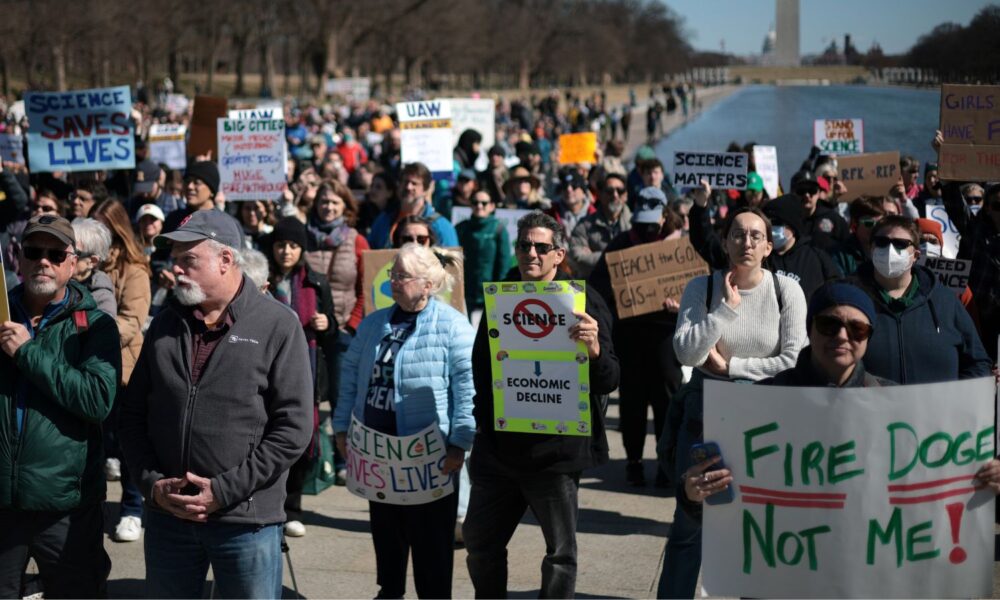This piece was originally published as an op-ed in Science with co-author Erica Chenoweth, Academic Dean for Faculty Development and the Frank Stanton Professor of the First Amendment at The John F. Kennedy School of Government, Harvard University.
The United States’ democratic leadership, commitment to freedom of expression, and investment in the pursuit of knowledge have enabled its leadership in science and technology. Yet today we are witnessing what happens to a nation’s science and technology enterprise when democratic principles and the rule of law are ignored. The rise of authoritarian actors and democratic backsliding in the US are driving this destruction of the federal science apparatus. Drawing from historical approaches that have been effective in pushing back against authoritarianism, the US scientific community is well-suited to play a leading role in a key strategy: Building alternative institutions outside of government that reduce reliance on the authoritarian regime, thus lessening its power and relevance over day to day life, and preserving sites of independent thought.
Despite court orders and Congressional mandates, federal science agencies are being hollowed out, scientific research grants are being severed, and public scientific resources—such as websites containing public health information—have been removed. During President Trump’s first term, his administration took similar aim at science and scientists. Now in his second term, the people and processes that had previously provided a check on those attacks—federal scientific integrity policies, inspectors general, and Congress, for example—are now severely diminished, or complicit in the actions the executive branch is pursuing.
We know from other countries and contexts that authoritarians often target the intellectual class in order to elevate loyalists, and suppress or sideline any who might have the knowledge, expertise, or power to challenge government transgressions. In response to such threats, the US scientific community can work to rebuild critical elements of the federal science enterprise now being dismantled or compromised, including science advisory committees and scientific assessments which for decades have helped ensure the best available science informs policy decisions. For instance, the administration has replaced Centers for Disease Control and Prevention (CDC) vaccine advisory committee members; disbanded key Environmental Protection Agency (EPA) advisory bodies on science, environmental justice, and pollution standards; and dismissed the 400+ authors of the congressionally mandated 6th National Climate Assessment. This is a classic tool in the authoritarian playbook: By squashing the science, the government seeks to avoid blowback for failing to make science-based policy decisions.
The US science community can build independent alternatives to these institutions, with several promising models for success. For example, when the first Trump administration disbanded an EPA scientific panel charged with advising on air pollution standards, the disbanded panel convened independently to review the evidence and advise the agency on the science of the health effects of particulate matter. This work supported successful legal challenges and faster progress when the next administration arrived. Following this model, fired federal science advisors are organizing an alternative version of the CDC Advisory Committee on Immunization Practices, and the Union of Concerned Scientists has released a toolkit providing guidance on independent science committees.
These efforts to develop independent science advice are beneficial regardless of future administration priorities. While they may not match the reach and respect of a formal government body, they preserve scientific truth in the public record, which can prove useful in legal proceedings. They can effectively counter misinformation coming from government officials and help hold them accountable. Moreover, even if the federal context doesn’t improve in the coming years, independent science infrastructure provides reliable science advice for other levels of government and for the public. The US scientific community now has the chance to apply this strategy at scale.
The ability to tell the truth, even (or especially) when it does not suit any particularly partisan aims, is an essential prerequisite for a free society. Scientists can leverage their substantial social standing and trustworthiness to preserve this vital ingredient. Under authoritarian conditions in the Soviet Union, many dissident leaders were prominent scientists, circulating underground writings that criticized the pseudo-science that the communist state approved and promoted. These materials helped to break through the wall of invincibility that the government tried to create—even when the dissidents themselves paid a price. While every would-be dissident has a different tolerance for risk, and while such efforts can’t fully recreate the the US science apparatus now being dismantled, it offers a proven pathway for preserving an essential role of science in society and those in the science community who are willing and able to be more visible can step up. And we must.

